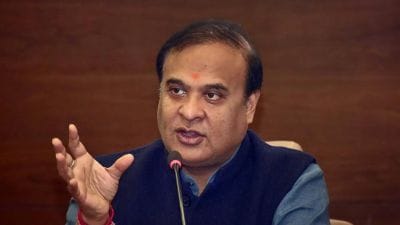Click here to join Express Pune WhatsApp channel and get a curated list of our stories
‘Everyone has something missing in their life. Mine is just visible’: The story of one of India’s most engaging storyteller
Born without a hand, Laksh Maheshwari's storytelling shows like ‘Ishq Sufiyana’ and ‘Main Tainu Phir Milangi’ draw packed audiences. They blend poetry, music, and philosophy, leaving listeners teary-eyed and smiling at once.
 Maheshwari turned his voice into his greatest strength, and became one of India’s most inspiring storytellers. (Express Photo)
Maheshwari turned his voice into his greatest strength, and became one of India’s most inspiring storytellers. (Express Photo)When Laksh Maheshwari steps on stage, the world falls silent. His voice, calm, carries a rhythm that doesn’t need music to move people. As he takes you on a journey of Amrita Pritam’s extraordinary life or the history of Sufi poetry and songs, powered just by his words, his expressions and a dash of humour you realise how much you have missed story telling that was probably your first introduction to an art form. Laksh brings that preciosu genre back to adulthood, and how.
But there is more to Laksh than his words. There is also his grit. Born without a left hand, Laksh could have lived a life shadowed by limitation. Instead, he turned his voice into his greatest strength- and became one of India’s most inspiring storytellers.
“I was born different, yes. But my parents never made me feel that way,” Laksh says. “They taught me everything from cycling to cricket, even driving. It took longer than usual, but they never gave up on me. That patience and faith built everything I am today.”
Laksh grew up in Mhow, Madhya Pradesh, in a close-knit family. His father was a civil contractor, while his mother was a homemaker and today, the two run a cozy cafe together, something Laksh speaks of with deep affection.
 Laksh’s storytelling shows like ‘Ishq Sufiyana’ and ‘Main Tainu Phir Milangi’- draw packed audiences across India. (Express Photo)
Laksh’s storytelling shows like ‘Ishq Sufiyana’ and ‘Main Tainu Phir Milangi’- draw packed audiences across India. (Express Photo)
“They’re living their second life,” he smiles. “I think I get my creative energy from them.” He also has a younger sister, now married and settled in Pune with two children. At 37, Laksh often spends his time traveling, exploring new places and stories that fuel his art. “Travel is what I do and love,” he says simply.
Growing up, Laksh often faced criticism and ridicule from classmates who didn’t understand the difference. “Children don’t have filters,” he says, smiling. “They’d say things like, ‘You can’t play with us.’ It hurt then, but I don’t blame them. We were just kids. What mattered was that my parents told me, again and again, that I was enough.”
But life didn’t straighten up its path easily. Laksh started his career in finance- a job that looked perfect on paper but felt hollow within. “I tried different professions over 14 years- from running restaurants and startups to writing books. But nothing made me happy. Then one day, I got on stage and spoke and I felt alive for the first time. That’s when I knew. This is it.”
Today, Laksh’s storytelling shows like ‘Ishq Sufiyana’ and ‘Main Tainu Phir Milangi’- draw packed audiences across India. His performances blend poetry, music, and philosophy, leaving listeners teary-eyed and smiling at once. Ishq Sufiyana, one of his most celebrated pieces, explores the idea of divine love through stories of Sufi saints like Amir Khusrau, Bulleh Shah, and Mirabai.
“What I want people to take home,” he told the Indian Express, “is a sense of how beautiful life truly is. You are enough. Be grateful. Be happy. Life is infinitely beautiful.”
Acceptance as a philosphy
Laksh’s voice- steady yet soft, carrying the kind of conviction that only comes from having known pain deeply. “There was a time I thought of my missing hand as my biggest weakness,” he admits. “But then my mother said something that changed my life -‘Things in life that you cannot change, you must accept.’ That one line became my strength.”
In Pune, his recent shows were sold out. The audience from young and old alike were left with teary smiles. “Pune is a city of theatre and art,” he says fondly. “The people here understand the feeling. They connect instantly.”
As an author, Laksh has extended his storytelling beyond the stage through his Descendants Trilogy. The series opens with The Descendants- Book 1 and continues with The Ancestors- Book 2, each bifurcating into intricate human emotions. Through themes of legacy, relationships, and self-discovery, the book mirrors the essence of his own journey- a search for meaning, connection, and identity that runs deep.
“Everyone has something missing in their life. Mine is just visible,” he says. “But if you look closely, you’ll realise- it’s never about what you don’t have. It’s about what you create with what you do.”
Click here to join Express Pune WhatsApp channel and get a curated list of our stories







